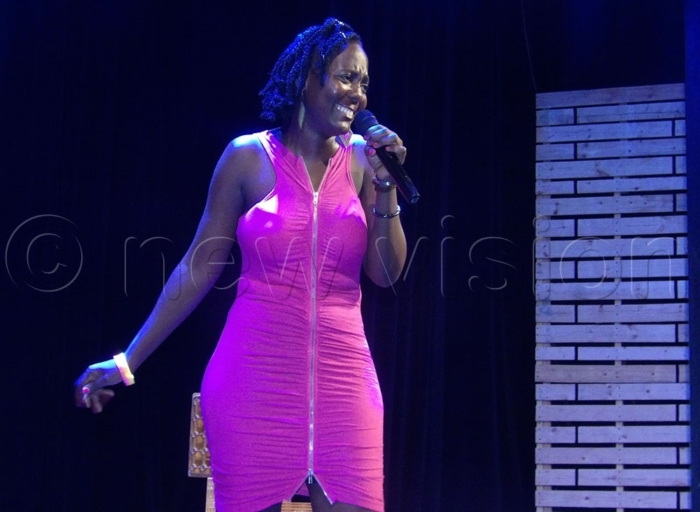Having creative spaces for women artists is one of the reasons why Njabala Foundation was established. The foundation, which was started in 2021 held its 2025 edition of the Annual Njabala Exhibition (ANE) with the theme Obulo Bwaffe, based on a traditional folktale.
The 2025 festival started on Friday and ends on March 13. It takes place in different Kampala art spaces, including Alliance Francaise, Xenson Art Space, Afropocene, Capsule, Lily Gardens in Kyanja and Nyungu Yamawe Park in Kira Municipality.

Martha Kazungu, the CEO of Njabala Foundation standing next to an artwork of one of the exhbitors at Xenson Art space. (Photo By Alfred Byenkya)
According to visual artist Martha Kazungu, the CEO of Njabala Foundation, Uganda, festival activities will include exhibitions, performances, talks, mentorship programmes, workshops, film screenings, book readings, poetry, round tables, speed meetings, talks, music, dance, among others.
“This platform will showcase extraordinary talent while sparking critical conversations that challenge societal norms and inspire change. We have invited many local and international visual artistes to be part of this event,” she said at the official opening of the festival that took place at Alliance Francaise in Kampala on Saturday.
Some of the international artistes that were present at the official opening ceremony included Sarah Waiswa (Kenya), Ba Toanga Julia Kaunda Kaseka (Zambia), Dr. Portia Malatjie (South Africa) among others.

British Council Uganda official Rashida Nalumoso speaking at the event. (Photo By Alfred Byenkya)
Speaking about the theme, she said it was inspired by the Obulo Bwaffe folktale, and the festival honours women as custodians of power, knowledge and agency amidst societal pressures.
The Obulo Bwaffe folktale is about Nakato and Babirye, twin sisters tasked by their mother, Nalongo, to protect their millet field from hungry birds during a time of famine. As the birds descend upon the field, they boldly proclaim, “Nakato leave us to eat… Babirye leave us to eat… our millet for life.” This audacious declaration from the birds mirrors the societal attitudes that often exploit women’s resources and labour.

Afroetry,the unpologetic poet doing performance on stage. (Photo By Alfred Byenkya)
“The story serves as a potent metaphor for women’s enduring strength and their right to own and control their own resources,” she said. “The birds’ demand, let’s eat our millet for life’, symbolizes the societal pressures and expectations that often encroach upon women’s autonomy and ownership. This timeless tale resonates deeply in contemporary society, where women continue to face challenges in asserting their rights and controlling their own destinies,” she explained.
The official opening ceremony was attended by officials from Alliance Francaise, Kampala, officials from the French Embassy, British Council and artistes that included Sandra Suubi, Afroetry and many female visual artists.



